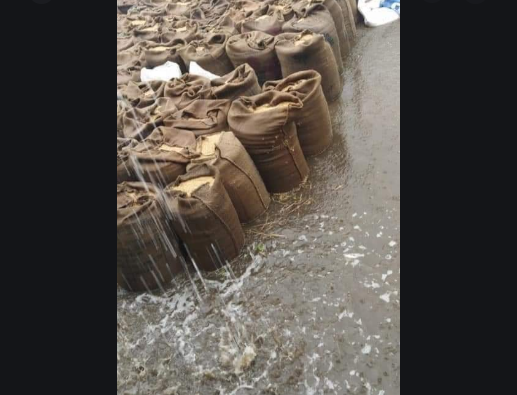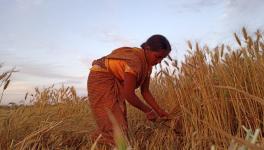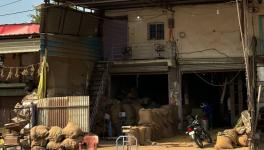COVID-19: Delay in Paddy Procurement and Rain Dash Hopes of Farmers

At a time when the harvest season is about to peak, un-seasonal rains and the nationwide lockdown has dented the hopes of farmers in Tamil Nadu. Farmers were waiting in government procurement centres with their harvests even before the lockdown was announced.
On Thursday, thousands of sacks of hard-earned paddy was drenched by rain in many parts of the state. Even though agriculture was exempted from the lockdown, a wretched procurement process resulted in farmers losing their harvest to the rain.
Farmers are now left with no hope of their soaked paddy being procured by government procurement centres. The lockdown coupled with the delay in procurement has cost the farmers dearly.
Farmers in Distress:
The farmers of Vandavasi taluk in Tiruvannamalai district had been waiting for more than three weeks for their paddy to be procured. The farmers and kisan unions allege that the administration worked in favour of middlemen. Government procurement centres are much sought after as farmers are ensured of the minimum support price (MSP). Farmers compete to get paddy sold to procurement centres while being made to keep their produce out in the open. Procurement centres are temporary in nature and offer no protection.
“The procurement centres do not ensure any protection for the paddy kept in waiting for procurement. They are kept in the open and at times the farmers themselves stay back to protect their sacks of paddy. When it rains, farmers are left with no option but to try and protect them. We have been demanding that the government ensures proper facilities to protect the paddy for years now,” said N. Radhakrishnan, Vandavasi taluk secretary of the All India Kisan Sabha (AIKS).
Centres Stop Procurement:
Procurement centres in Tiruvannamalai district have announced a halt in the procurement of paddy till April 14, a deadline which is set to extend further. Farmers are set to face losses as they have to take back the wet paddy, dry it, and then bring it back. It all amounts to further delay in the procurement process.
While all of this happens, middlemen are also at work, delaying procurement. They procure paddy from farmers of different villages at a price much lower than the MSP, sell it in procurement centres, and make a quick buck.
“Officials and middlemen are hand-in glove in carrying out such a dastardly act. The middlemen are given priority as they bribe the officials, resulting in a longer wait for poor farmers”, added Radhakrishnan.
However, these centres only procure between 10% to 15% of the paddy, leaving farmers to sell their produce at a much lower price to private buyers. The remaining produce is sold in the regulated markets which follow an auctioning process, where buyers and middlemen have the final say. Here again, the farmers are at a loss, but the cost of rice in open markets continues to increase.
The MSP Letdown:
Farmers are demanding for a much higher price for their produce as input costs continue to rise. The Union Government announced an MSP of Rs 1,835 per quintal for Grade ‘A’ and Rs 1815 per quintal for common grade produce. The state government had announced an incentive of Rs 70 and Rs 50 for the two qualities respectively while farmers were expecting the MSP to be fixed at Rs 2,500, despite demanding for Rs 3,000 per quintal.
P. Shanmugam, the state general secretary of the AIKS said, “The union government announced an increase of just Rs 65 in MSP per quintal which we strongly opposed. The government has to consider a much higher price, as per promises made by the Bharatiya Janata Party during the 2014 general elections. If exploitation by middlemen and such low prices courtesy the government continue, the farmers may even give up farming itself, owing to heavy losses.”
Get the latest reports & analysis with people's perspective on Protests, movements & deep analytical videos, discussions of the current affairs in your Telegram app. Subscribe to NewsClick's Telegram channel & get Real-Time updates on stories, as they get published on our website.
























